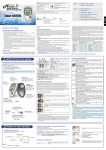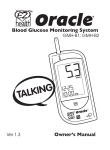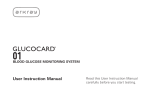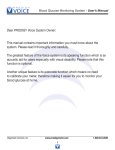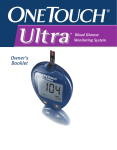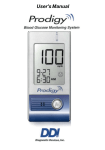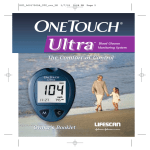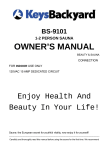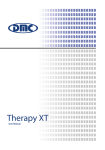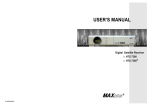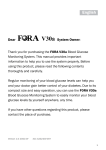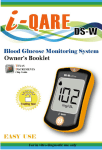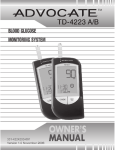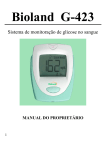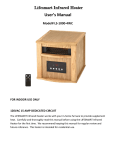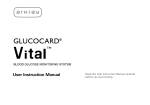Download User Manual.pmd - Know Sugar – BLOOD GLUCOSE MONITORING
Transcript
INTRODUCTION Thank you for selecting KNOW SUGAR Blood Glucose Monitoring System. The system was produced in close association with diabetes healthcare professionals, most importantly, people with diabetes. i This manual contains important information you must know about the system. Please read it thoroughly and carefully. For short simple instructions, a quick reference card is provided for your convenient use. If you have any questions or enquiries, please contact your local distributor or us for help. The KNOW SUGAR is designed to help you and your healthcare professionals monitor your blood glucose levels. All questions about interpreting the results should be directed to your healthcare professionals. The KNOW SUGAR is the latest technology for blood glucose monitoring, easy to use and will give you fast and accurate results with a minimal sample of blood. The 1 KNOW SUGAR Meter : Allows you to perform test with capillary whole blood or venous whole blood. Allows you to perform Alternative Site Testing (capillary whole blood from palm and forearm). Has memory and data management capabilities. It gives you and your healthcare professional powerful graphic tools to manage your diabetes. IMPORTANT SAFETY INSTRUCTIONS READ THIS BEFORE USING. The following basic safety precautions should always be taken. 1. Close supervision is necessary when the device is used by, on, or near children, handicapped persons or invalids. 2. Use the device only for the intended use described in this manual. 3. Do not use test strips and control solutions which are not supplied by the manufacturer. 4. Do not use the device if it is not working properly, or if it has suffered any damage. 5. Before using any product to test your blood glucose, read all instructions thoroughly and practice the test. Do all quality control checks as directed and consult with a diabetes healthcare professional. Warning: Keep the test strips vial away from children; the vial cap and the test strips can be a potential choking hazard. Never chew or swallow a test strip. If this occurs, please seek medical assistance immediately. KEEP THESE INSTRUCTIONS WITH YOU. 2 TABLE OF CONTENTS INTRODUCTION ..................................................... 1 TABLE OF CONTENTS .......................................... 3 ABOUT ALTERNATIVE SITE TESTING(AST) ........ 7 ABOUT OKMETER OPTIMA SYSTEM ................... 9 CONTENTS OF THE SYSTEM .............................. 11 KEY FUNCTIONS OF THE METER .......................12 METER DISPLAY ................................................... 14 KEY FUNCTIONS OF THE TEST STRIP .............. 15 SETTING YOUR METER ...................................... 17 CONTROL SOLUTION TEST ................................ 21 PREPARE FOR BLOOD SAMPLING .................... 26 PERFORMING BLOOD TEST ............................... 28 UNDERSTANDING YOUR TEST RESULT ........... 31 3 COMPARING WITH LABORATORY RESULTS......32 MEMORY RECALL ................................................ 34 REVIEWING RESULTS ON A PERSONAL COMPUTER........................................................... 36 REPLACING THE BATTERY ................................ 37 CARING FOR YOUR METER AND TEST STRIP... 39 PERFORMANCE CHARACTERISTIC .................. 41 DISPLAY MESSAGES AND PROBLEM-SOLVING GUIDE ................................ 43 SYMBOLS DESCRIPTION..................................... 46 CONTACT INFORMATION .................................... 47 LIMITED WARRANTY ........................................... 48 WARRANTY REGISTRATION CARD ................... 51 ! 1. 2. 3. 4. 5. 6. 7. 4 IMPORTANT HEALTH-RELATED INFORMATION Apply only fresh, capillary or venous whole blood sample to test your blood glucose. Applying other substances or plasma, serum will cause wrong results. Severe dehydration and excessive water loss may cause false low results. If you believe you are suffering from severe dehydration, consult your healthcare professional immediately. If you are experiencing symptoms that are not consistent with your blood glucose test results and you have followed all instructions described in this user s manual, consult your healthcare professional. Test results below 60 mg/dL (3.3mmol/L)*1 indicates low blood glucose (hypoglycemia). Test results greater than 240 mg/dL (13.3mmol/L)*2 indicates high blood glucose (hyperglycemia).If your results are below 60 mg/dL(3.3mmol/L) or above 240 mg/dL(13.3mmol/L), repeat the test, and if the results are still below 60 mg/dL(3.3mmol/L) or above 240 mg/dL(13.3mmol/L), consult your healthcare professional immediately. Inaccurate results may occur in severely hypotensive individuals or patients in shock. Inaccurate low results may occur for individuals experiencing a hyperglycemic-hyperosmolar state, with or without ketosis. Critically ill patients should not be tested with blood glucose meters. Below 35% or above 55% hematocrit levels can cause false results. Please consult your adviser if you do not know your level. Interference: Reducing substances occurring in the blood naturally (uric acid, bilirubin) or from therapeutic treatments (ascorbic acid, acetaminophen) will not significantly affect OKmeter Optima test results. However, the limiting concentrations of several compounds are listed below: Compounds Lowest concentrations tested at which no interference occurred Compounds Lowest concentrations tested at which no interference occurred Compounds Lowest concentrations tested at which no interference occurred Uric Acid Gentisic Acid Acetaminophen Hydroxyurea Ascorbic Acid 0.48 mmol/L (8 mg/dL) 0.28 mmol/L (5.0 mg/dL) Dopamine Levodopa Methyldopa 0.11 mmol/L (2 mg/dL) 0.51 mmol/L (10 mg/dL) 0.13 mmol/L (3.0 mg/dL) Dopamine Levodopa 0.53 mmol/L (8.0 mg/dL) Cholesterol 0.39 mmol/L (3 mg/dL) Tolbutamide Triglycerides 14.8 mmol/L (400 mg/dL) Creatinine 22.6 mmol/L (2000 mg/dL) Galactose Maltose 3.33 mmol/L 1.54 mmol/L 12.9 mmol/L 50 mmol/L 26.3 mmol/L 0.44 mmol/L (60 mg/dL) (90 mg/dL) (500 mg/dL) (5 mg/dL) (900 mg/dL) (900 mg/dL) 8. Please refer to your test strip package insert for additional important information. 5 0.28 mmol/L (5.0 mg/dL) REFERENCE: *1: Kahn, R. and Weir, G.: Joslinis Diabetes Mellitus, 13thed Philadelphia : Lea and Febiger (1994), 489. * 2: Krall, L.P. and Beaser, R. S.: Joslin Diabetes Manual. Philadelphia : Lea and Febiger (1989), 261-263. 6 ABOUT ALTERNATIVE SITE TESTING(AST) There are important limitations for doing AST. Please consult your healthcare professional before you perform AST. What is AST? Alternative Site Testing (AST) means you can use parts of the body other than your fingertips to check your blood glucose levels. The OKmeter Optima allows you to test your palm and forearm with equivalent results to fingertip testing. What is the advantage? Fingertips feel pain more readily because they are full of nerve endings (receptors). At other body sites, nerve endings are not so numerous and you will not feel as much pain as you will experience at the fingertip. What to use AST? Food, medication, illness, stress and exercise can affect blood glucose levels. Capillary blood at fingertip reflects these changes faster than capillary blood at other sites. Therefore, if you are testing blood glucose level during or immediately after meal, physical 7 exercise or stressful event, take the blood sample from your fingertip only. Use AST only: In a pre-meal or fasting state (more than 2 hours since the last meal). Two hours or more after taking insulin. Two hours or more after exercise. During steady state blood glucose conditions. Do NOT use AST if: You have reason to believe you have hypoglycemia or hyperglycemia. Your routine glucose results are often fluctuating. You are pregnant. How to increase the accuracy? Stimulating blood perfusion by rubbing the puncture site prior to blood extraction has a significant influence on the glucose value obtained. Blood from the site without rubbing exhibits a measurably different glucose concentration than blood from the fingertip. When the puncture site was rubbed prior to blood extraction, the difference was significantly reduced. Important: To increase the accuracy when using AST, rub the puncture site more than 20 seconds before extracting blood. 8 ABOUT OKMETER OPTIMA SYSTEM Intended Use IVD The system is intended for use outside the body (in vitro diagnostic use only). It should be used only for self-testing blood glucose (blood sugar) by people with diabetes and by healthcare professionals to monitor glucose concentrations in whole blood. The system should not be used for the diagnosis of diabetes or for the testing of newborns. Test Principle Blood glucose is measured by an electrical current that is produced when a blood samples mixes with the reagent (special chemicals) of the test strip. The electrical current changes with the amount of glucose in the blood sample. The KNOW SUGAR Meter measures the strength of the electrical current, calculates your blood glucose level and then displays your result in either mg/dL or mmol/L. About the System The KNOW SUGAR Meter system uses the latest technology to provide you with easy and comfortable testing. The system requires only a 0.7¼L of blood sample to complete the testing in only 6 seconds. The KNOW SUGAR system consists of 1. KNOW SUGAR blood glucose meter 2. KNOW SUGAR blood glucose test strips 3. KNOW SUGAR solution These products have been designed, tested and proven to work together as a system to produce 9 accurate blood glucose test results. Important : Use only KNOW SUGAR test strips and control solutions with your KNOW SUGAR meter. Use other test strips and control solutions with this meter can produce inaccurate results. Caution 1. The user should not take any decision of medical relevance without first consulting his or her medical practitioner. 2. Call your doctor immediately if you experience symptoms that are not consistent with your blood glucose test results. 3. A sample with large amount of reducing substances such as ascorbic acid and uric acid may cause result slightly higher than the actual glucose level. 4. High altitudes above than 3,402 meter (11,158 feet) may affect the test results. 5. Temperatures outside the range of 10°C to 40°C (50°F to 104°F) may affect the test results. Do not test beyond of temperature range. 10 CONTENTS OF THE SYSTEM The KNOW SUGAR complete kit includes: KNOW SUGAR blood glucose meter X 1 KNOW SUGAR blood glucose test strips X 10* KNOW SUGAR control solution (normal) X 1 * Lancing device X 1 Lancets X 10* Carrying bag X 1 User s manual X 1 Quick reference guide X 1 Strip instruction X 1* Control solution instruction X 1* Battery (CR2032) -preinstall in the meter X 1 NOTE : The KNOW SUGAR meter is available as a meter only or as a complete kit. Contents might vary by different package. For meter only, products with * mark are excluded. Please review the contents of your purchase. If any items are missing, please return your meter to the place of purchase. 11 KEY FUNCTIONS OF THE METER Study this diagram and become familiar with all the parts of your OKmeter Optima. 3 1 7 6 5 2 4 1. LCD DISPLAY: The large, easy to read display shows test results, messages, test results stored in memory. 2. M BUTTON: Main button, press button to turn the meter on or perform other functions 12 described in this manual. 3. STRIP SLOT: Insert the test strip here. The meter will turn on automatically. 4. SET BUTTON: Located in the battery compartment; press button to enter meter setting. Refer to “SETTING YOUR METER” section of this user s manual for details. 5. BATTERY COMPARTMENT: Holds ONE 3v Lithium battery (battery type CR2032). The battery is pre-installed into meter when new purchasing. 6. DATA PORT: RS232 port, allows you to transfer the information stored in the meter to a computer to view, analyze and print. Refer to “REVIEWING RESULTS ON A PERSONAL COMPUTER” Section of this user s manual for details. 7. METER LABEL: Each meter has its unique number on it. It can be used when you want to obtain warranty service. Please do not alter or tear the label off. 13 METER DISPLAY 1. DATE: Display Year, month and date. 1 2 2. TIME: The meter is programmed for a 12 hour period format. 3. AVERAGE: Appears when the meter is in the memory mode while recalling 7/14/28 day test averages. 3 4. MEMORY SYMBOL: Appears when in the memory mode. 4 5 5. THERMOMETER SYMBOL: Appears when ambient temperature is above or below the acceptable range needed for testing. 6 7 10 9 8 6. CONTROL SOLUTION TEST SYMBOL: Appears when you are in Control Solution Mode. Your test result will not be stored in meter memory. 7. UNIT OF MEASURE: Appears with the test result either in mg/dL or mmol/L. 8. BATTERY SYMBOL: Appears when battery is weak. 9. BLOOD DROP SYMBOL: Flashes when sample should be applied. 10. STRIP SYMBOL: Appears when the meter is turned on and waiting for inserting a test strip. 14 KEY FUNCTIONS OF THE TEST STRIP 1 2 3 4 1. ABSORBENT CHANNEL: apply a drop of blood here, the blood will be drawn in automatically. 2. CONFIRMATION WINDOW: this is where you confirm if enough blood has been drawn into the test strip s absorbent channel. 3. TEST STRIP HANDLE: hold this part to insert the test strip into the meter slot. 4. CONTACT BARS: Insert this end of the test strip into the meter until it will go no further. Important Test Strip Information 1. Test strips are for single use only. 2. Store the vial in a cool, dry place below to 40°C/104°F and above 4°C/39°F. Do not refrigerate. 3. Store your test strip in their original vial only. Do not transfer them to a new vial or any other container. 4. With clean, dry hands, you may touch the test strip anywhere on its surface when removing it from the vial or inserting it into the meter. 5. Immediate use a test strip after removing it from the vial, replace the vial cap and close it tightly. 6. Only apply a blood sample or a control solution sample to the test strip s absorbent channel. Applying other substances to the test strip s absorbent channel will cause inaccurate results. 15 7. 8. 9. 10. Do Do Do Do not not not not use test strips beyond the expiration date indicated on the strip vial label. place in direct heat or sunlight. carry loose glucose strips in your carrying case. use damaged test strips or test strips changed in any way. Warning : Keep the test strips vial away from children; the vial cap and the test strips can be a potential choking hazard. Never chew or swallow a test strip. If this occurs, please seek medical assistance immediately. 16 SETTING YOUR METER Your KNOW SUGAR meter comes with the date, time, and unit of measurement preset. However, if you change the time or replace the battery, you should check and update the time and date. STEP 1. Enter Setting Mode Start with the meter off. Open the battery cover. Press SET BUTTON located at the right side of battery compartment. The meter will turn on and enter the setting mode. STEP 2. Set the Year The year appears with the number flashing. Press and release the M BUTTON to obtain the desired year. Press SET BUTTON to confirm and move to next MONTH setting. STEP 3. Set the Month The month appears with the number flashing. Press and release the M BUTTON to obtain the desired month. Press SET BUTTON to confirm and move to next DATE setting. 17 STEP 4. Set the Date The date appears with the number flashing. Press and release the M BUTTON to obtain the desired date. Press SET BUTTON to confirm and move to next HOUR setting. STEP 5. Set the Hour The hour appears with the number flashing. Press and release the M BUTTON to obtain the desired hour. Press SET BUTTON to confirm and move to next minutes setting. STEP 6. Set the Minutes The minute appears with the number flashing. Press and release the M BUTTON to obtain the desired minute. Press SET BUTTON to confirm and the meter will enter to next unit setting. STEP 7. Set the Unit of Measurement The existing unit (for example, mg/dL) will appear and flashing. Press and hold the M BUTTON for 3 seconds to change the unit to mmol/L. Press SET BUTTON to confirm and the meter will enter to next delete all memory setting. 18 STEP 8. Delete Memory When the dEL symbol and the flashing memory symbol appear on the display, you can choose to clear the memory. If you do not want to clear the memory, press the SET BUTTON again to skip this step. If you want to clear ALL memory, press and hold M BUTTON for 4 seconds. The “—-” image will appear on the LCD screen to indicate that all memory has been deleted. STEP 9.Complete Setting After delete memory, the meter will display “OFF” before shut down. The meter setting is now completed. 19 IMPORTANT : 1. The time, date and unit of measurement can ONLY be changed in the setting mode. Therefore, when you perform a blood glucose testing, it is not possible to change those parameters. 2. Your meter displays 7, 14 and 28-day averages which you can access from the meter memory. These averages are calculated from your latest result obtained during the last 7, 14 and 28 days. 3. Your meter can display test result in milligram per deciliter (mg/dL) or millimoles per liter (mmol/L). The mg/dL unit is standard in the United States. The mmol/L unit is standard in Canada and European countries. Your meter has been preset at the factory with the standard unit measurement used where you live. When you turn off the meter or replace the battery, the unit will not be changed. 4. Use of the wrong unit of measure may cause you to misinterpret your blood glucose level, and may lead to incorrect treatment. Please always consult with your healthcare professionals before you reset the unit of measure. 20 CONTROL SOLUTION TEST KNOW SUGAR Meter Control Solution KNOW SUGAR Meter control solutions contain a known amount of glucose that reacts with KNOW SUGAR test strips. By testing your control solution and comparing the test results with the expected range printed on the test strip vial label, you can make sure that the meter and the test strips are working properly together as a system and that you are performing the test correctly. It is very important that you do this simple check routinely to make sure you get accurate results. Why perform a control solution test? 1. To ensure that your meter and test strip are working properly together. 2. To allow you to practice testing without using your own blood. When should the control solution test be performed? 1. When you first get your KNOW SUGAR meter. Before use this system to test your blood, you can practice the procedure by using control solution. When you can do three tests in a row that are within the expected range, you are ready to test your blood. 2. Once a week (to make sure that you continue to get accurate results) 3. When you begin using a new vial of test strips. 4. Whenever you suspect that the meter or test strips are not working properly. 5. When your blood glucose test results are not consistent with how you feel, or when you think your results are not accurate. 21 6. When test strips are exposed to extreme environmental conditions. 7. If you drop the meter. 8. After changing the batteries. ! Important Control Solution Information 1. Use only KNOW SUGAR control solution. 2. Check the expiration date on the control solution bottle. Do not use if expired. 3. Control solution, meter, and test strips should come to room temperature (68-86 ºF/20-30ºC) before testing. 4. Shake the bottle before use, discard the first drop of control solution after squeezing, wipes off the dispenser tip to avoid contaminations. These steps ensure you will get a good sample and an accurate result. 5. Store the control solution closed at temperatures below 30ºC (86ºF). Do not refrigerate. NOTE : 1. There are two levels of control solution (normal and high) available to choose from. The control solution supplied with the meter kit is normal level. Please contact with your local distributor for other level of control solution. 2. The control solution range printed on the test strip vial is for OKmeter Control Solution only. It is used to test meter and strip performance. It is not recommended range for your blood glucose level. 22 How to Perform a Control Test STEP 1. Insert Test Strip Insert a new test strip into the strip slot, the meter will activate. STEP 2. Check Code Number When the code number appears on the screen, compare the number against the code number on the strip vial. If the two numbers match, you may begin test, otherwise press M button to code your meter first. STEP 3. Mark as a Control Solution Test. After the blood symbol( ) appears, press M BUTTON and a CONTROL SOLUTION TEST SYMBOL ( ) shows up, now you are in the Control Solution Mode. The meter will not store your test result in the memory when you preset the test as a control solution test. If you decide not to perform a control solution test, press M BUTTON again and the CONTROL SOLUTION TEST SYMBOL ( ) will disappear. 23 STEP 4. Squeeze a drop of Control Solution Shake control solution bottle well. Remove the cap. Squeeze the bottle, discard the first drop and wipe off the dispenser tip with a clean tissue paper or cotton. Squeeze the bottle again to get the second drop onto a clean non-absorbent surface or on your fingertip first. STEP 5. Apply Control Solution Apply the drop to the opening of the strip absorbent channel until the confirmation window is filled. The meter begins to count down. STEP 6. Check if the Test Result is in Range After the meter counts down form 6 to 1, the test result shows up. Compare the test result with the range printed on the test strip vial. The result should fall within the printed range. NOTE : 1. Be sure that you are in Control Solution Mode so that the test result will not be stored in the meter memory. 2. To avoid contaminating the control solution with the content of the test strip, DO NOT APPLY THE CONTROL SOLUTION DIRECTLY TO THE TEST STRIP! 24 3. If test result falls outside the range printed on the test strip vial, repeat test first. If you continue to get the result falling outside the range, your meter and test strip may not be working properly. DO NOT use the system to test your blood until you get a test result falls within the control range. If you are unable to resolve the problem, please contact your local distributor for help. 25 PREPARE FOR BLOOD SAMPLING Adjustable Lancing Device Lancet 2 5 4 1 1 3 Your lancing device and lancets are used for obtaining 1. Protective cap capillary blood samples from the puncture site. 1. Lancing Device Cap 2. Depth Selector 3. Lancet Holder 4. Cocking Control 5. Release Button ! Important Lancing Device and Lancets Information 1. 2 Lancet is for single use only. 2. Keep lancing device and lancets clean. 3. Use caution when removing the used lancet from the device and when disposing the used lancet. 4. The lancing device and lancets are in conformity with MDD 93/42/EEC. Refer to product labels for contact information of manufacturer and CE marking. Important : The meter and lancing devic are for single patient use. Do NOT share them with anyone including other family members ! Do NOT use on multiple patients ! 26 Set Lancing Device 1. Screw off the cap of lancing device. Insert a lancet into the lancet holder and push down until it is fully seated. 2. Twist off the protective cap until it separates from the lancet. 3. Replace the lancing device cap and set the puncture depth to the desired number. NOTE : The depth selector offers 5 levels of skin: 1-2 for soft or thin skin 3 for average skin 4-5 for thick or calloused skin 4. Pull back the cocking control until it makes a click, and then release. If it does not click, the device may have been cocked when the lancet was inserted. 27 PERFORMING BLOOD TEST STEP 1. Wash Your Hands and the Puncture Site Wash your hands in warm, soapy water. Rinse and dry completely. Warm your fingers to increase blood flow. STEP 2. Insert Test Strip Remove a new test strip from vial. Be sure to tightly replace vial cap after removing test strips. Insert test strip immediately into strip slot as illustrated. The meter turns on automatically. STEP 3. Check Code Number When the code number appears on the screen, compare the number against the code number on the strip vial. If the two numbers match, you may begin test, otherwise press M button to code your meter first. After the blood symbol ( ) appears, the meter is prepared and you can select and lance a puncture site. 28 STEP 4. Select and Lance a Puncture Site *For Fingertip Hold the prepared lancing device firmly against the side of your fingertip. Press release button. *For AST(palm and forearm) Please refer to the “About Alternative Site Testing (AST)” Section. Please consult your healthcare professional before obtaining blood from site other than your fingertip. STEP 5. Obtain a Blood Sample Gently massage your finger or puncture site to obtain the required blood volume. To perform the test, you need only 0.7¼L of blood sample. Do not smear the blood sample. To obtain best accurate result, wipe off the first drop of blood and gently squeeze another drop of blood. STEP 6. Apply Blood Sample Apply the blood sample to the opening of absorbent channel of test strip until the confirmation window is fully covered with blood. Then the meter begins to count down and shows up test result in 6 seconds. 29 STEP 7. Read Your Result The meter will display your blood glucose value. STEP 8. Remove Strip to Turn Meter Off Your blood glucose result is automatically stored in the meter memory. Turn the meter off by removing the test strip. Discard the used strip and lancet safely in a puncture resistant container. IMPORTANT : 1. The KNOW SUGAR Meter only requires a tiny sample of blood to perform a test. Choose a different spot each time you test. Repeat puncture in the same spot may cause soreness and calluses. 2. The first drop of blood usually contains tissue and serum, which may affect the test result. It should be discarded. 3. The blood should be completely filled the confirmation window before the meter begins to count down. If you find that the confirmation window is not filled with blood when the meter is counting, NEVER try to add more blood to the test strip. Discard the test strip and retest with a new one. 4. If you do not apply a blood sample within two (2) minutes, the meter will automatically turn off. You must remove the test strip and re-insert it again to turn on the meter and restart the test procedure. 5. If you have trouble filling the test strip, please contact your local distributor for assistance. 30 UNDERSTANDING YOUR TEST RESULT Normal Blood Glucose Range The normal blood glucose range is 70 to 105 mg/dL (3.9 to 5.8 mmol/L) for a fasting, non-diabetic adult, but less than 140 mg/dL (7.8 mmol/L) two hours after meals. Consult your healthcare professional to find out your target blood glucose value. If your blood glucose result seems unusually high or low, or inconsistent with your previous results, check the following: 1. 2. 3. 4. 5. 6. Was the blood sample applied immediately to the test strip after removing it from the vial? Was the volume of the blood sample sufficient? Was the meter setting the right code? Was the test strip vial cap tightly sealed? Was the test strip used before the expiration date? Were the test strips stored away from extreme temperatures in very cold or hot weather or from areas of high humidity? Then run a control test with OKmeter control solution. If the control test result is within the acceptable range, review testing procedure and repeat your blood glucose test with a new test strip. If your blood glucose value is still inconsistent with your previous results, glucose trend, or how you feel, contact your doctor immediately for help. 31 COMPARING WITH LABORATORY RESULTS The result you obtain from your meter may differ somewhat from your laboratory result due to normal variation. Meter results can be affected by factors and conditions that do not affect laboratory results in the same way. To make an accurate comparison between meter and laboratory results, follow the guidelines below. Before you go to the lab 1. 2. 3. Perform a control solution test to make sure that the meter is working properly. It is best to fast for at least eight (8) hours before doing comparison tests. Take your meter with you to the lab. While at the lab 1. 2. 3. 4. Make sure that the samples for both tests (the meter test and the lab test are taken and tested within 15 minutes of each other). Wash your hands before obtaining a blood sample. Never use your meter with blood that has been collected in a gray-top test tube. Use fresh whole blood only. You may still have a variation from the result because blood glucose levels can change significantly over short periods of time, especially if you have recently eaten, exercised, taken medication, or 32 experienced stress*1. In addition, if you have eaten recently, the blood glucose level from a finger stick can be up to 70 mg/dL (3.9 mmol/L) higher than blood drawn from a vein (venous sample) used for a lab test*2. Therefore, it is best to fast for eight hours before doing comparison tests. Factors such as the amount of red blood cells in the blood (a high or low hematocrit) or the loss of body fluid (severe dehydration) may also cause a meter result to be different from a laboratory result. REFERENCE : 1: Surwit, R.S., and Feinglos,M.N.: Diabetes Forecast (1988),April, 49-51. 2: Sacks,D.B.: „Carbohydrates. „ Burtis, C.A.,and Ashwood, E.R.( ed.), TietzTextbook of Clinical Chemistry.Philadelphia:W.B. Saunders Company (1994), 959. 33 MEMORY RECALL The KNOW SUGAR Meter automatically stores 120 test results, letting you review them in order from the most recent to the oldest. The meter also calculates and displays 7, 14 and 28-day averages. You can review the individual or average test result by entering the memory mode. Recall the Memory STEP 1. Enter the Memory Mode While the meter is turned off, press M BUTTON to turn on the meter. When the strip symbol blinks in the display, press M BUTTON again to enter memory mode. STEP 2. Recalling Average Test Results When entering the memory mode, the 7-day average will appear. If you continue to press the M BUTTON, the 14-day and 28-day averages will appear in order. 34 STEP 3. Recalling Individual Test Results After 28-day average, the most recent test result with date and time will be shown. Press M BUTTON once and the next most recent test result will appear. Each time you press and release the M BUTTON, the meter will recall up to your last 120 test results in order. When the memory is full, the oldest result is dropped as the newest is added. After reaching the last set of result, the meter will display 7-day average again. STEP 4. Exit the Memory Mode If you want to exit the memory mode, press and hold M BUTTON for three (3) seconds to turn off the meter. NOTE : 1. The control solution results are NOT stored in the memory if you preset the control test correctly. (Please refer to the “CONTROL SOLUTION TEST” Section for details). The list of past results and the result average are for blood glucose results only. 2. When using the meter for the first time, “——” is displayed. When you recall the test results or review the average result, it means that there is no test result in memory. 3. The averages are calculated from your latest result obtained during the last 7, 14 and 28 days. 4. Anytime in memory mode, you can press M BUTTON for three seconds to exit and turn off the meter. 5. While in the memory mode, if you leave the meter alone without any action for one (1) minute, the meter will turn off automatically. 35 REVIEWING RESULTS ON A PERSONAL COMPUTER Results in memory can be transmitted to a personal computer. Diabetes Management Software and an RS232 Interface Cable are needed before installation. To learn more about Diabetes Management Software or to obtain an RS232 Interface Cable sold separately, please contact your local retailer or distributor. STEP 1. Install Software Install the Diabetes Management Software on your Computer by following the instructions provided by us. STEP 2. Connect to Personal Computer Connect the RS232 Interface Cable to your computer. With the meter turned off, connect the Interface Cable to the Data Port of the meter. The meter will turn on and „„Lnk † will appear on the display, indicating that the meter is ready to transmit data. “PC” will appear on the display, indicating that the meter is successfully communicating to your computer. You can begin to download the data from the meter. STEP 3. Transmit Data Follow the instructions provided in the software to transmit data. Results transmitted will include date and time. Remove the RS232 cable and the meter will automatically turn off. NOTE : While the meter is connected to the PC, it is unable to perform a blood glucose test. 36 REPLACING THE BATTERY The meter comes with ONE Lithium batteries (battery type CR2032) (preinstalled when new purchasing). Battery life will vary depending on usage, so always keep a spare battery on hand. The battery should last about 1000 tests or 12 months when testing 3 times a day. When the battery symbol appears on the meter display, battery is getting low. You will still be able to test with low battery, but you should replace it as soon as possible. When battery symbol appears together with E-b on the display, the meter will no longer give results and you must replace the battery immediately. Please always have one spare battery with you to ensure that you can replace the battery anytime. How to replace the battery 1. Make sure the meter is turned off. Let the front of the meter rest in the palm of your hand. Press the buckle on the battery cover and life up to open the cover. Remove the battery. 37 2. With the plus (+) side up, place the battery (battery type CR2032) in the compartment and slide it upwards until it is locked into place. You should hear a beep to indicate the battery installed correctly. If not, please replace the battery correctly. 3. Close battery cover. NOTE : 1. Replacing the battery does not affect the test result stored in memory. However the time and date may need to re-set. 2. As with all small objects, the battery should be kept away from small children as a safety precaution. If the battery is swallowed, see medical assistance immediately. 3. Batteries might leak chemicals if not used for a long time. Remove the batteries if you are not going to use the device for extended (i.e., 3 months or more.) 4. Discard the used or dead batteries properly according to the regulations of your country. 38 CARING FOR YOUR METER AND TEST STRIP To avoid the meter and test strips getting dirt, dust or other contaminants, please wash and dry your hands thoroughly before use. Cleaning Your meter does not require special maintenance. As long as no blood or control solution comes in direct contact with the meter, there is no special cleaning required. 1. 2. To clean the meter exterior, wipe with a cloth moistened with tap water or a mild cleaning agent, then dry the device with a soft and dry cloth. Do not flush with water. Do not use organic solvents to clean the meter. Your meter is a precision instrument. Please handle it with care. Storage 1. * * * * Meter Storage Storage condition: -40F~1220F (-200C~500C), below 90% relative humidity. Always store or transport the meter in its original storage case. Avoid dropping and strong impact. Avoid direct sunlight and humidity. 2. Strip Storage * Storage condition: 390F~1040F(40C~400C) and between 10~85% relative humidity. 39 * * * * * * * Do not refrigerate. Store your test strips in their original vial only. Do not transfer to other container. Store test strip packages in a cool and dry place. Keep away from direct sunlight and heat. After removing a test strip from the vial, immediately replace the vial cap and close it tightly. Touch the test strip with clean and dry hands. You may touch the test strip anywhere with clean, dry hands when removing it from the vial or inserting it into the meter. * Use each test strip immediately after removing it from the vial. * Do not bend, cut, or alter a test strip in any way. * Keep the strip vial away from children since the cap and the test strip can be a potential choking hazard. If swallowed, please seek medical assistance immediately. 3. Control solution storage * Storage condition: Store the control solution tightly closed at temperatures below 860F (300C). Do not refrigerate. 40 PERFORMANCE CHARACTERISTIC Accuracy: Within ± 15 mg/dL(0.83 mmol) at glucose concentration < 75 mg/dL(or 4.2 mmol/L) and within 20% glucose concentration > 75 mg/dL(or 4.2 mmol/L). Precision: CVs(%) of intermediate precision and repeatability were less than 5%. 41 SYSTEM SPECIFICATIONS Model Name Assay Method Test Sample Test Result Alternative Site Testing Sample Size Measuring Time Measuring Range Acceptable Hematocrit Range Operating Condition Storage/Transportation Condition Memory Capacity Power Supply Battery Life Automatic shut-off Dimensions Weight 42 OK-10H Electrochemical biosensor Capillary or Venous Whole Blood Referenced to plasma glucose value YES (palm, forearm) 0.7 ¼L 6 seconds 20 – 600 mg/dL (1.1 – 33.3 mmol/L) 35~55% 10°C~40°C(50°F~104°F), between 10-85% R. H. 4°C~40°C(39°F~104°F), between 10-85% R. H. 120 test results with time and date One 3-volt Lithium Battery (battery type CR2032) Approximately 1,000 tests In 2 minutes 80 mm(L)x 48 mm(W) x 15 mm(H) 37 g DISPLAY MESSAGES AND PROBLEM-SOLVING GUIDE The following is a summary of some display messages and symbols. These messages help to identify certain problems but do not appear in all cases when a problem has occurred. Improper use may cause an inaccurate result without producing an error message. In the event of a problem, refer to information under “action to take” DISPLAY DESCRIPTION ACTION TO TAKE Display check If some parts of the display are not working. Contact your local distributor for help Moving Strip The meter is waiting for test strip be inert. Blinking Blood. The meter is ready for blood applying into test strip. \ 43 Deleting memory Test result is higher than 600 mg/dL (33.3 mmol/L) Test result is lower than 20 mg/dL (1.1 mmol/L) 44 Deleting is complete If this is not confirmed by the way you feel, review proper testing procedure and perform a control test. Repeat blood test, if the display still appears, please call medical assistance immediately. Battery is weak Replace battery soon. Battery is dead Replace battery now. Maybe: 1. Used strip or moistened strip 2. defective meter You have to: 1. Repeat test with sufficient sample. 2. Contact your local distributor for help Temperature is out of the operating range. The meter is not working. Move to an area with temperature between 10ºC to 40ºC (50ºF - 104ºF) and wait at least 30 minutes. Do not artificially heat or cool the meter. No responses when strip is inserted into the meter Maybe: 1. Battery is dead 2. Wrong strip be inserted 3. Meter is defective You have to: 1. Replace battery 2. Insert the test strip correctly 3. Contact your local distributor for help No responses when blood sample is applied to the strip Maybe: 1. Blood sample is not sufficient. 2. Meter is defective You have to: 1. Repeat test with a new test strip 2. Contact your local distributor for help 45 SYMBOLS DESCRIPTION IVD 2 LOT ! For in vitro diagnostic use. Temperature limitation / Store at Please consult instructions for use Use by /Expiry date Do not reuse Manufacturer Lot number Caution, consult accompanying document EC REP CE 0123 EU representative This product fulfils the requirements of Directive 98/79/EC in vitro diagnostic medical device. The device has certificated to meet the following standards: 98/79/EC, IEC 60601-1, IEC 61010-1, IEC 60601-1-2, IEC 61326, and ISO 15197 46 CONTACT INFORMATION Mkt by Parsi Anjuman, Vazirabad, Nanded - 431 601 (INDIA) Ph : +912462 244778 Fax : +912462 244779 E-mail : [email protected] www.rahulsurgicals.com 47 LIMITED WARRANTY The manufacturer warrants that the system shall be free of defects in material and workmanship for a period of two (2) years. This warranty is valid from the date of purchase. The warranty extends only to the original purchaser and is not transferable. To obtain warranty service, you must take the Product, or deliver the Product freight prepaid, in either its original packaging or packaging affording an equal degree of protection, to Rahul Surgicals, Nanded or your local distributor. To get full satisfaction, it should be properly used & maintained as per instructions & description provided in the user s manual. The warranty covers only products purchased. The Warranty does not cover the following: 1. Transportation costs & risks of transport. 2. Cost of repairs and / or defects resulting from repairs carried out by unauthorized persons. 3. Periodic check-ups, maintenance & repair. 4. Breakage of Display Screen and damage of delicate parts (viz., accidental dropping of the device or that of heavy object on the device. 5. Any exposure of device with dampness / water / spillage of solutions and excessive heat (including direct sunlight) causing damage to the device body, electronic and mechanical parts whether intentionally or otherwise. 6. Alteration / removal / defacing the Serial Number of the device. 7. Failure or wear & tear of accessories besides the main device (Meter) itself. 8. Damages of any kind including personal caused accidentally or by misuse. 9. Battery Replacement is not covered during warranty. 48 Costs arising due to non-acceptance of a claim (those will be charged for) Written notice of the specific manufacturing defect in workmanship or malfunction must be intimated. Repair or replacement under the warranty does not give rise to any extension or renewal of the warranty period. This warranty will be applicable only if the complete product & the warranty card are sent and if the warranty card is completely filled-in & returned within ten (10) days. Rahul Surgicals, Nanded & its authorized distributor / resellers reserve the right to refuse warranty services if any unclear information has been given. WARNING: This apparatus may or may not suit all users. For your own safety and other healthcare reasons, you are strongly advised to consult your Doctor. Disclaimer of warranty: THIS WARRANTY IS EXPRESSLY MADE IN LIEU OF ANY AND ALL OTHER WARRANTIES EXPRESSED OR IMPLIED INCLUDING THE WARRANTIES OF MERCHANTABILITY AND FITNESS FOR USE. Limitations of Liability: In no event shall the manufacturer & its distributors / resellers be liable for indirect special or consequential damages, even if the manufacturer & its distributors / resellers has been advised of the possibility of such damages. 49 FROM STAMP TO: 50 WARRANTY REGISTRATION CARD The manufacturer warrants to the original retail purchaser that this meter will be free from defects in materials and workmanship for 2 years from the date of the original purchase. During the 2 year period, we shall, at no charge, repair or replace a unit found to be defective with an equivalent or current version of the owner s model. The warranty of the repaired meter or replacement will expire on the date of the original warranty expiration or ninety (90) days after shipment of the repaired or replacement system, whichever period is longer. This warranty is limited to replacement due to defects in parts or workmanship. Failure of the meter due to damage by accident, abuse, or use not in accordance with the instructions is not covered by this warranty. Parsi Anjuman, Vazirabad, Nanded - 431 601 (INDIA) Ph : +912462 244778 Fax : +912462 244779 E-mail : [email protected] www.rahulsurgicals.com Name : Address : Telephone Number : Email Address : Meter Serial Number : Date of Purchase : Purchased From (Dealer Name) : 51 Dealer (Stamp)




















































